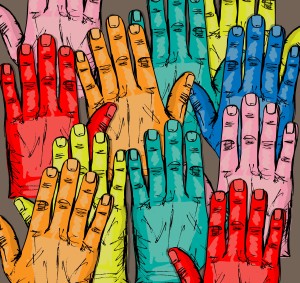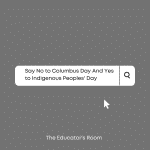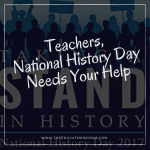 On Saturday, April 12, I again attended the Organization of American Historians Conference 2014 in Atlanta. Saturday was a very busy day as there were more people there than on Friday. I arrived to the conference around 10:00 AM and explored the exhibition hall. Several of the publishers represented there were giving away their stock for free or for a very low price. Let’s just say I walked away with a stack of amazing history books to read over the summer. It also gave me a chance to talk to publishing house representatives about what could and could not be used by K-12 teachers. They were very interested in non-college/university level educators’ opinions.
On Saturday, April 12, I again attended the Organization of American Historians Conference 2014 in Atlanta. Saturday was a very busy day as there were more people there than on Friday. I arrived to the conference around 10:00 AM and explored the exhibition hall. Several of the publishers represented there were giving away their stock for free or for a very low price. Let’s just say I walked away with a stack of amazing history books to read over the summer. It also gave me a chance to talk to publishing house representatives about what could and could not be used by K-12 teachers. They were very interested in non-college/university level educators’ opinions.
The time had come to go to a session. Since there were only three session times a day, I had to choose which one I wanted really wanted to attend. Sadly, due to unforeseen circumstances, this turned into my only session out of the three. There were several interesting ones, but I decided that I would attend the session, “Bridging the Black and Green: African American & Irish Freedom struggles in 19th/20th.” This interested me personally since I had studied Irish history in college and grad school as well as some of the connections between African American leaders and Irish/Irish American leaders. The session, which covered the 1840’s, 1880’s, and 1960’s/1970’s, gave a quick overview of what different ways African Americans and the Irish tried to connect in their different but related struggles in the United States or Ireland. My overall take-away from session: Irish and African American struggles for freedom were a common cause between 1840s-1970s
Interesting points made during the session:
Ian Delahanty- Speaker on 1840’s
o The 1840’s saw the Abolitionist movement trying to connect and intertwine with the Repeal movement in Ireland (attempt to repeal the union between Britain and Ireland.)
o Daniel O’Connell (Repeal Leader)was vocal against slavery and slaveholders as well as an Irish nationalist.
o Abolitionists hoped that O’Connell’s abolitionism would bridge anti-slavery and Irish nationalism.
o Frederick Douglass did a speaking tour of Ireland on the 1840’s.
o Douglass pushed for Irish to sever ties with friends/family who hold slaves in U.S.
o Douglass argued that Irish could leave the country if they wanted a better life. They could reform, petition, etc. Slaves could not.
o Question during repeal period- Should Irish Nationalist care about anti-slavery?
o If Irish wanted freedom, must move away from others who oppress.
o Many Irish nationalists in Union Army felt Emancipation would help restore Union.
Millington Bergeson-Lockwood- Speaker on 1880’s
o Connection between African American and Irish Political Coalitions could be described with look at protest, politics, and past.
o Belief during late 1800’s- If Irish Americans and African Americans could overcome misconceptions, they could form powerful coalition.
o 1885- Boston Advocate arranged a benefit concert hoping to build Irish/African American common cause.
o Late 19th- A turn from Republican Party by Black Bostonians as Irish Boston Democrats court them for politics.
o 1884- Boston Globe reports surprise among White Bostonian Republicans seeing Black Bostonians voting Democrat.
o Black Bostonians and Irish Bostonians shared oppressed pasts.
o Late 1880s – Many Irish Bostonians called for equal rights for the fellow Black Bostonians.
Rachel Oppenheimer- Speaker
o 1960’s/1970’s looks at IRA in Northern Ireland and Black Panthers connection.
o Irish Civil Rights cited US Civil Rights movement, MLK, SCLC, SNCC, etc.
o IRA began looking at BPP and Malcolm X though as movement became more militant.
o Faulkner in Northern Ireland try to use similar tactics against IRA or Irish Civil Rights members as like in US.
o Support for IRA jumps due to Bloody Sunday, peaceful march against internment where 13 marchers were killed.
o Prisoners of internment in Northern Ireland “required reading list” included many writings by BPP members.
Minkah Makalani- Speaker
o Discussing some other scholarship/works about Black/Irish coalitions or connections.
o Ex: Steve McQueen, Black/English director-12 Years A Slave did Hunger, film about 1981 Hunger Strike in Northern Ireland.







Leave a comment